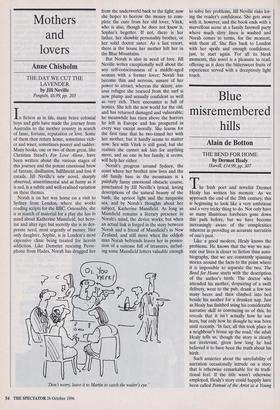Mothers and lovers
Anne Chisholm
In fiction as in life, many brave colonial boys and girls have made the journey from Australia to the mother country in search of fame, fortune, reputation or love. Some of them then return home, sometimes rich- er and wiser, sometimes poorer and sadder. Many books, one or two of them great, like Christina Stead's For Love Alone, have been written about the various stages of this journey and the potent emotional brew of fantasy, disillusion, fulfilment and loss it entails. Jill Neville's new novel, sharply observed, unsentimental and as funny as it is sad, is a subtle and well-realised variation on these themes.
Norah is on her way home on a visit to Sydney from London, where she works reading scripts for the BBC. Ostensibly, she is in search of material for a play she has in mind about Katherine Mansfield, her hero- ine and alter ego; but secretly she is in des- perate need, most urgently of money. Her only daughter, Sophie, is in London's most expensive clinic being treated for heroin addiction. Like Demeter rescuing Perse- phone from Hades, Norah has dragged her THE DAY WE CUT THE LAVENDER by Jill Neville Penguin, £6.99, pp. 203 from the underworld back to the light; now she hopes to borrow the money to com- plete the cure from her old lover, Vitek, who is also, though he does not know it, Sophie's begetter. If not, there is her father, her showbiz personality brother, or her solid doctor sister. As a last resort, there is the house her mother left her in the Blue Mountains.
But Norah is also in need of love. Jill Neville writes exceptionally well about the wry self-consciousness of a middle-aged woman with a former lover; Norah has become thin and nervous, unsure of her power to attract, whereas the skinny, anx- ious refugee she rescued from the surf is now plump and sexually confident as well as very rich. Their encounter is full of ironies. She left the new world for the old, and has returned damaged and vulnerable; he meanwhile has risen above the horrors he left in Europe and has prospered in every way except morally. She learns for the first time that he two-timed her with her mother, but it hardly seems to matter now. Sex with Vitek is still good, but she realises she cannot ask him for anything more, and no one in her family, it seems, will help her either.
Norah's progress around Sydney, the coast where her brother now lives and the old family base in the mountains is a painfully funny emotional obstacle course, punctuated by Jill Neville's lyrical, loving descriptions of the natural beauty of the bush, the apricot light and the turquoise sea, and by Norah's thoughts about her subject, Katherine Mansfield. As long as Mansfield remains a literary presence in Norah's mind, the device works; but when an actual link is forged in the story between Norah and a friend of Mansfield's in New Zealand, and still more when the oddjob man Norah befriends leaves her in posses- sion of a suitcase full of treasures, includ- ing some Mansfield letters valuable enough `Don't worry, leave it to Martin to catch the waiter's eye' to solve her problems, Jill Neville risks los- ing the reader's confidence. She gets away with it, however, and the book ends with a marvellous scene at a family farewell party where much dirty linen is washed and Norah comes to terms, for the moment, with them all. She flies back to London with her spoils and enough confidence, just, to start again. For all its bleak moments, this novel is a pleasure to read, offering as it does the bittersweet fruits of experience served with a deceptively light touch.


















































































 Previous page
Previous page